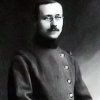Max Stirner

Max Stirner
Johann Kaspar Schmidt, better known as Max Stirner, was a German philosopher. He is often seen as one of the forerunners of nihilism, existentialism, psychoanalytic theory, postmodernism, and anarchism, especially of individualist anarchism. Stirner's main work is The Ego and Its Own, also known as The Ego and His Own. This work was first published in 1845 in Leipzig, and has since appeared in numerous editions and translations...
NationalityGerman
ProfessionPhilosopher
Date of Birth25 October 1806
CountryGermany
God sinks into dust before man.
Apart from any other basis which might justify a superiority, education, as a power, raised him who possessed it over the weak, who lacked it, and the educated man counted in his circle, however large or small it was, as the mighty, the powerful, the imposing one: for he was an authority.
Might is a fine thing, and useful for many purposes; for "one goes further with a handful of might than with a bagful of right."
If the child has not an object that it can occupy itself with, it feels ennui; for it does not yet know how to occupy itself with itself.
The web of hypocrisy of today hangs on the frontiers of two domains, between which our time swings back and forth, attaching its fine threads of deception and self-deception. No longer vigorous enough to serve morality without doubt or weakening, not yet reckless enough to live wholly to egoism, it trembles now toward the one and now toward the other in the spider-web of hypocrisy, and, crippled by the curse of halfness, catches only miserable, stupid flies.
Only the free and personal man is a good citizen (realist), and even with the lack of particular (scholarly, artistic, etc)culture, a tasteful judge (humanist).
Liberty of the people is not my liberty!
He who must expend his life to prolong life cannot enjoy it, and he who is still seeking for his life does not have it and can as little enjoy it.
There are intellectual vagabonds, to whom the hereditary dwelling-place of their fathers seems too cramped and oppressive for them to be willing to satisfy themselves with the limited space any more: instead of keeping within the limits of a temperate style of thinking, and taking as inviolable truth what furnishes comfort and tranquility to thousands, they overlap all bounds of the traditional and run wild with their imprudent criticism and untamed mania for doubt, these extravagating vagabonds.
Yes, yes, children must early be made to practise piety, godliness, and propriety; a person of good breeding is one into whom good maxims have been instilled and impressed, poured in through a funnel, thrashed in and preached in.
When one is anxious only to live, he easily, in this solicitude, forgets the enjoyment of life. If his only concern is for life, and he thinks "if I only have my dear life," he does not apply his full strength to using, i. e., enjoying, life.
I have no need to take up each thing that wants to throw its cause on us and show that it is occupied only with itself, not with us, only with its good, not with ours. Look at the rest for yourselves. Do truth, freedom, humanity, justice, desire anything else than that you grow enthusiastic and serve them?
He who is infatuated with Man leaves persons out of account so far as that infatuation extends, and floats in an ideal, sacred interest. Man, you see, is not a person, but an ideal, a spook.
Let us look and see, then, how they manage their concerns - they for whose cause we are to labour, devote ourselves, and grow enthusiastic.